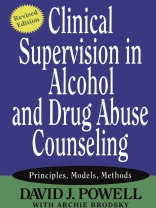‘The perfect handbook for the clinical supervisor.’
–Nancy Waite-O’Brien, director, Education and Training,
Betty Ford Center
‘An outstanding contribution to the professional well-being of
the addiction field.’
–Thomas Mc Govern, editor, Addiction Treatment
Quarterly
‘Forever useful.’
–S. Beckett, education and training coordinator, National
Association of Alcohol and Drug Abuse Counselors
表中的内容
Figures and Tables ix
Acknowledgments xi
Introduction to the 2004 Edition xiii
Introduction to the 1993 Edition xxiii
Part One: Principles
1 A Historical Review of Supervision 3
2 A Working Definition of Supervision 10
3 Leadership Principles for Supervisors 20
4 Traits of an Effective Clinical Supervisor 40
Part Two: Models
5 Building a Model of Clinical Supervision 53
6 A Developmental Approach to Supervision 68
7 The Psychodynamic Model 103
8 The Skills Model 116
9 Family Therapy Models 128
10 A Blended Model of Clinical Supervision for the Alcoholism and Drug Abuse Field 141
Part Three: Methods
11 Establishing a Supervisory Contract 179
12 Basic Supervisory Techniques 191
13 Evaluation and Feedback 228
14 Innovative Techniques in Supervision 253
15 Ethical and Legal Concerns 273
16 Special Issues in Supervision 299
17 New Directions for the Future 320
Appendixes
A Competencies of Supervisors 327
B Role Delineation Study for Clinical Supervisors 333
C Assessing One’s Preparation as a Clinical Supervisor 341
D Determining Readiness to Be a Supervisor 345
E Counselor Evaluation of the Supervisor 347
F Evaluation of the Counselor 351
G Individual Development Plan 355
H Use of the Sociogram 363
I Suggested Outline for Case Presentations 369
J Counselor Assessment Forms 373
References 381
About the Authors 403
Index 404
关于作者
David J. Powell, Ph.D., LADC, CCS, is president of the International Center for Health Concerns, Inc., a health consulting company. He assists worldwide in the education and training of behavioral health professionals. Formerly he was president of ETP Inc. and in that capacity oversaw clinical supervision training programs for the U.S. Navy and Marine Corps worldwide.
Archie Brodsky is senior research associate at the Program in Psychiatry and the Law, Massachusetts Mental Health Center, Harvard Medical School.












